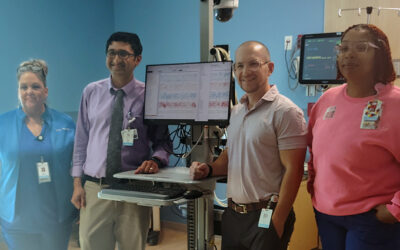Our modern lives are full of activities, obligations, and deadlines. It’s easy to feel anxious or even experience some depression.
When these feelings become overwhelming there are mental health resources and professionals who can help. But, for most of us, mindfulness is can be the key to a better life.
Bob Prehn, PhD, and Sonya Summerlin, LMFT, from St. Dominic’s Behavioral Health Services, offer some practical steps to help you keep your own mental wellbeing top of mind.
What is “Mindfulness”?
Mindfulness is the basic human ability to be fully present, aware of where we are and what we’re doing, and not overly reactive or overwhelmed by what’s going on around us. While mindfulness is innate, it can be cultivated through proven techniques. Here are some examples:
- Seated, walking, standing and moving meditation
- Short pauses inserted into everyday life
- Merging meditation with other activities, such as a daily devotion/prayer practice, yoga or sports
- Guided visualization including muscle relaxation
Six Facts About Mindfulness
- Mindfulness is not obscure or exotic. It’s familiar to us because it’s what we already do, how we already are. But practicing mindfulness improves the results.
- Mindfulness is not a special added thing we do, but we can foster these innate qualities with simple practices that have scientifically proven results.
- Anyone can do it. Mindfulness practice cultivates universal human qualities and does not require anyone to change their beliefs. Everyone can benefit and it’s easy to learn.
- It’s a way of living. Mindfulness brings awareness and caring into everything we do and cuts down needless stress.
- It is evidence based. Both science and experience demonstrate when we’re mindful, we reduce stress, enhance performance, gain insight and awareness.
- It sparks innovation. As we deal with our world’s increasing complexity and uncertainty, mindfulness can lead us to effective, resilient, low-cost responses to seemingly difficult problems.
Simple Ways to Start
- Wake up 15 minutes early. Spend this time sitting quietly, eyes closed and reflect on the day ahead, your feelings and expectations. You can even use a daily scripture or devotion topic to guide this time.
- Write down: “Today I Will…” and list what you plan to do. Review yesterday’s list.
- Take a walk. Research shows that a 45-minute walk reduces stress and anxiety. Best results were found for afternoon walks (as opposed to mornings) in quiet surroundings like parks or walking trails.
Finally, remember that learning mindfulness is like learning to play the piano: Practice, Practice, Practice. Get started, practice daily and the results will surprise you!
Recommended Mindfulness Resources
- Stanford Health Library: Mindfulness + Medication Resources
- UCLA Health: Guided Meditations
- The Free Mindfulness Project: Resources
- City of Hope: 10-Minute Guided Imagery Meditation
Stop the Stigma
Our perceptions influence our stress level. Managing your mindset can help tackle stress before it affects you. Still, the stresses of life can easily sneak up on us. Stress-related illnesses are real. But there is also the stigma of getting help for mental or emotional issues.
Help #StopTheStigma. If you or a loved one feel the need to take the next step for your mental health, St. Dominic’s Behavioral Health Services offers free assessments for walk-ins and by appointment. Call (601) 200-3125 to schedule. Assessments help guide individuals to the care they most need whether that is with an outpatient therapist or psychiatrist or in an inpatient setting.




